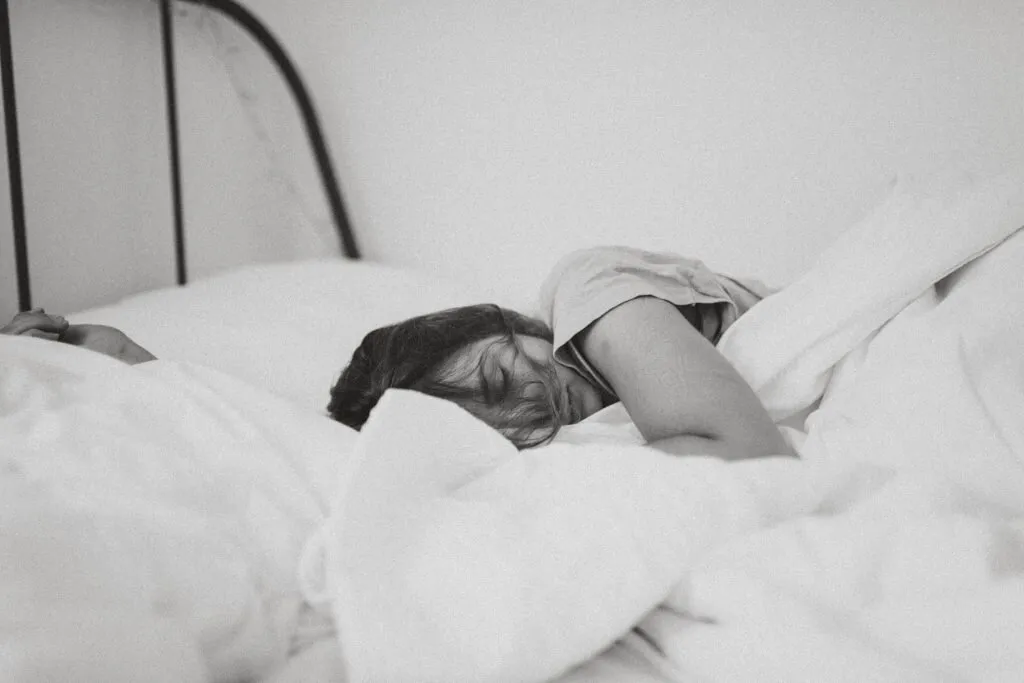What Happens if You Don’t Get Enough Sleep?
– You’re more like to suffer from infertility
– You’ll have an easier time gaining weight and a harder time losing it
– You’re more likely to have food cravings and constant desire to snack
– You’ll have a weakened immune system making you more susceptible to infections
– You’re more likely to feel depressed, anxious, irritable, and angry
– Your ability to cope with stress decreases
– Your risk of developing many chronic diseases increases: think cancer, Alzheimer’s, type 2 diabetes, high blood pressure
-Your life expectancy decreases
As you see, getting enough sleep is crucial when it comes to your overall health. It’s not just about having enough energy to make it through the day.
How Much Sleep Do We Need?
There is plenty of research out there showing that adults need to be asleep for a minimum of 7 hours. Seven to nine hours of sleep per night is the sweet spot and I’m talking hours asleep, not hours in bed – these are two very different things!
Top 2 Factors I See Affecting Sleep:
1 – Cortisol: Cortisol is one of our stress hormones. It should spike in the morning as your signal to get up and get going, and decreases gradually throughout the day. Cortisol works opposite melatonin – our sleep hormone. When one is high the other should go down and vice versa. This helps to regulate our sleep-wake cycle aka our circadian rhythm. I see many patients who have cortisol doing the wrong thing at the wrong time which can have a significant impact not only on your sleep, but also your mood and energy. If cortisol is too high in the evening I can almost guarantee you are not sleeping well.
The following symptoms are common in those who have cortisol issues:
– You have a hard time falling asleep
– You can’t shut your brain off while you’re laying in bed
– You find you get a second wind in the evening after being tired all day
– You’re tired when you wake up in the morning
– Your energy dips mid-afternoon
– You may wake up in the middle of the night between 2-3 am for no known reason
– You feel anxious or depressed, or a little on edge
What can you do?
The answer is A LOT!
Step One: Determine if cortisol is actually the issue. We can use blood, urine, or saliva testing to do so. In order to understand your cortisol patterns, we need to see your levels at various times in the day to ensure it’s spiking adequately in the morning, and low at bedtime.
Step Two: Regulate your cortisol levels to rebalance your circadian rhythm. There are many well researched interventions we can use including lifestyle habits, dietary changes, as well as herbal and nutrient supplementation.
2 – Melatonin: Melatonin is our sleep hormone. It is the signal for our body that it is time to fall asleep, and also impacts our ability to stay asleep throughout the night. The blue light emitted by our devices (computers, phones, TVs) decrease our body’s melatonin production. Many of us spend our evenings on our devices without realizing the impact it’s having on our sleep. High levels of cortisol in the evening will also lower melatonin production – talk about double trouble!
What you can do?
Best case would be to avoid screen use 2 hours before bed. If this isn’t possible, consider investing in a pair of blue light blocking glasses and wearing them in the evening when you’re using screens to decrease the impact your devices are having on your sleep. You can purchase inexpensive blue light blocking glasses off amazon and even ask your optometrist to add the blue light blocking lens to your next pair of prescription glasses. There are also settings on newer phones and laptops to decrease the amount of blue light they emit in the evening. If melatonin is low because cortisol is high, the solution is going to be to address your cortisol levels.
3 – Other Common Issues That Affect Asleep:
i) Deficient or suboptimal nutrient levels including Iron, B vitamins, Magnesium, Protein
ii) Caffeine and Alcohol Use
iii) Hormonal Imbalances
iv) Jet leg or Shift Work
v) Exercise
Do you need help with a plan to get your sleep on track? Reach out! Our team of Naturopathic Doctors are happy to help.
Happy snoozing!

